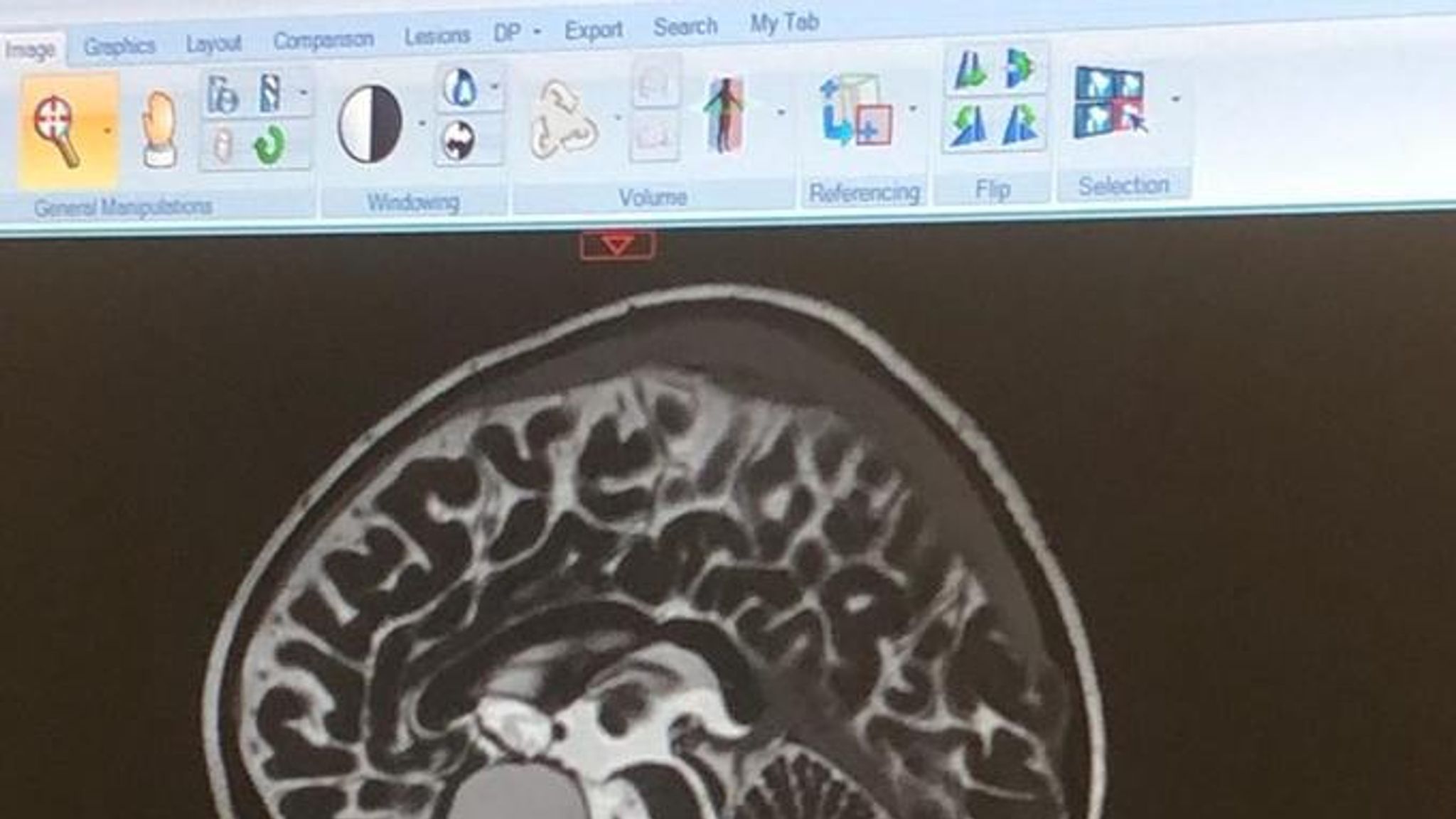Can A Routine Eye Test Detect A Brain Tumour?
Let’s face it, folks—our health is everything. And when it comes to detecting serious conditions like brain tumours, early detection can literally save lives. But here’s the big question: Can a routine eye test really help spot something as serious as a brain tumour? Believe it or not, the answer is a resounding YES! Yep, you heard me right. An eye test might just be the unexpected superhero in your healthcare journey.
Now, before we dive deep into the nitty-gritty, let me tell you why this topic matters so much. Brain tumours are no joke. They can sneak up on anyone, often without warning signs that are easy to spot. But guess what? Your eyes could be whispering clues about what’s going on inside your noggin. And that’s where a routine eye test comes in handy.
So, if you’ve ever wondered whether an eye test could do more than just check if you need glasses, stick around. This article is about to blow your mind—or at least give you some peace of mind. We’re diving headfirst into the science, the possibilities, and the importance of keeping those peepers in check. Let’s go!
- Vegam Movie The Ultimate Guide To The Future Of Gaming Movies
- Bollyflix Anime Hindi Dubbed Your Ultimate Guide To Exciting Entertainment
Understanding the Basics: What Is a Brain Tumour?
Alrighty, let’s start with the basics. A brain tumour is basically a lump of abnormal cells growing in your brain. Sounds scary, right? But here’s the deal—it can be either cancerous (malignant) or non-cancerous (benign). Either way, it’s not something you want hanging around in your head. The tricky part? Symptoms can vary wildly depending on where the tumour is located and how fast it’s growing.
Some common symptoms include headaches, nausea, seizures, and even changes in vision. Yep, you read that right—vision changes can be a red flag. That’s where our trusty eyes come into play. But more on that later. For now, just remember that early detection is key. The sooner you catch it, the better your chances of fighting it—or even beating it altogether.
How Common Are Brain Tumours?
Now, you might be wondering how common brain tumours really are. According to the American Brain Tumor Association, roughly 87,000 people in the U.S. alone are diagnosed with a primary brain tumour each year. That’s a lot of folks! And here’s the kicker—many of these cases are caught late because the symptoms are often mistaken for something less serious.
- Unlock The World Of Entertainment With Vegamoviesdesi Junction
- Why Vegha Movie Is The Hottest Ticket In Town Right Now
So, what’s the takeaway? Regular check-ups, including eye tests, could make all the difference. It’s like having a built-in early warning system for your health. Pretty cool, huh?
Can an Eye Test Really Detect a Brain Tumour?
Here’s the million-dollar question: Can a routine eye test really detect a brain tumour? The short answer is yes—but with a little asterisk. During an eye test, optometrists can spot signs of increased pressure in the brain, a condition known as papilledema. This happens when the optic nerve swells due to pressure inside the skull. And guess what? That swelling can be a sign of a brain tumour.
But hold up—it’s not always as simple as spotting swelling and diagnosing a tumour. Other conditions, like high blood pressure or infections, can also cause papilledema. That’s why further testing is usually needed to confirm a brain tumour. Still, the fact that an eye test can raise red flags is pretty darn impressive.
What Happens During an Eye Test?
Let’s break it down. During a routine eye test, your optometrist will check your vision, eye pressure, and the overall health of your eyes. But here’s the kicker—they’ll also examine the back of your eyes, where the retina and optic nerve live. Using a tool called an ophthalmoscope, they can get a good look at the optic disc. If it’s swollen or looks abnormal, that could be a sign of trouble.
Now, don’t freak out if your optometrist mentions something unusual. Most of the time, it’s nothing serious. But if they do spot something suspicious, they’ll likely refer you to a specialist for further testing. And that’s where the real detective work begins.
Why Early Detection Matters
Okay, here’s the thing—brain tumours are serious business. The earlier you catch one, the better your chances of successful treatment. And that’s where early detection becomes crucial. Think of it like this: if you find out about a problem early, you’ve got more options for dealing with it. You can start treatment sooner, explore different options, and even avoid some of the more serious complications.
But how does an eye test fit into all of this? Well, it’s like having an extra set of eyes on your health. By catching potential issues early, you can take action before things get worse. And that’s what makes regular eye tests such a valuable part of your healthcare routine.
The Importance of Regular Eye Exams
Now, I know what you’re thinking—“Do I really need to get my eyes checked every year?” The answer is a big fat YES. Even if you don’t wear glasses or contacts, regular eye exams are essential for keeping tabs on your overall health. They can catch all sorts of issues, from glaucoma to diabetes, and even brain tumours.
Plus, let’s be real—your eyes are working hard every day. They deserve a little TLC. So, whether you’re nearsighted, farsighted, or blessed with perfect 20/20 vision, make sure you’re scheduling those eye exams. Your future self will thank you.
What to Expect During an Eye Test
Alright, let’s talk about what actually happens during an eye test. First off, don’t stress—it’s not as scary as it sounds. Most eye tests take about 20-30 minutes, and they’re completely painless. Your optometrist will start by asking about your medical history and any symptoms you might be experiencing. Then, they’ll move on to the fun stuff—like checking your vision, eye pressure, and the health of your eyes.
One of the most important parts of the exam is the fundus examination. This is where your optometrist uses an ophthalmoscope to get a good look at the back of your eyes. They’ll be checking for things like swelling, bleeding, or any other abnormalities. If everything looks good, you’re good to go. But if they spot something unusual, they’ll likely refer you to a specialist for further testing.
What Happens If They Find Something?
Now, let’s say your optometrist does spot something suspicious during your eye test. Don’t panic! The next step is usually a referral to a neurologist or neuro-ophthalmologist. These specialists will run more detailed tests, like an MRI or CT scan, to get a better look at what’s going on inside your brain.
If they confirm the presence of a brain tumour, they’ll work with you to develop a treatment plan. This might include surgery, radiation therapy, chemotherapy, or a combination of all three. The good news is that early detection can make a huge difference in the success of treatment. So, if you ever find yourself in this situation, remember that you’re not alone—and you’ve got a team of experts ready to help you every step of the way.
Common Symptoms of Brain Tumours
Okay, let’s talk symptoms. While an eye test can help spot signs of a brain tumour, there are other symptoms you should be aware of too. Some of the most common ones include persistent headaches, nausea, vomiting, seizures, and changes in vision. If you’re experiencing any of these symptoms, it’s important to see a doctor right away.
Other red flags to watch out for include personality changes, memory problems, and difficulty with balance or coordination. Again, these symptoms can be caused by a variety of conditions, so it’s important to get a proper diagnosis. But if you’re concerned, don’t hesitate to seek medical advice.
When to See a Doctor
So, when should you see a doctor about potential brain tumour symptoms? The answer is simple—if something feels off, get it checked out. Don’t wait for symptoms to get worse before seeking help. Early detection is key, and the sooner you catch a problem, the better your chances of successful treatment.
And remember, you don’t have to wait for symptoms to get an eye test. Regular check-ups can help catch issues before they become serious. So, whether you’re feeling fine or not-so-great, make sure you’re staying on top of your health.
How to Prepare for an Eye Test
Alright, so you’ve decided to book that eye test—congrats! Now, let’s talk about how to prepare. First off, make sure you bring any glasses or contact lenses you currently use. Your optometrist will want to check their prescription and make sure they’re still working for you.
It’s also a good idea to bring a list of any medications you’re taking, as some can affect your eyes. And if you have any specific concerns or symptoms you want to discuss, jot them down ahead of time so you don’t forget. Finally, wear comfortable clothes and bring sunglasses if you’re sensitive to bright lights after the exam.
Tips for a Stress-Free Eye Test
Here are a few tips to help you stay calm and collected during your eye test:
- Take deep breaths and relax. It’s just an eye test, not a root canal.
- Ask questions if you’re unsure about anything. Your optometrist is there to help, not judge.
- Don’t stress if you can’t read the smallest line on the chart. It happens to the best of us.
- Bring a friend or family member for moral support if you need it.
Remember, an eye test is just one part of your overall healthcare routine. Treat it like any other appointment—important, but not something to lose sleep over.
Conclusion: Why Routine Eye Tests Matter
So, there you have it—routine eye tests really can help detect brain tumours. By keeping tabs on the health of your eyes, you’re also keeping an eye on what’s going on inside your head. And that’s pretty darn impressive if you ask me.
Now, here’s the thing—if you’ve been putting off that eye test, it’s time to stop procrastinating. Regular check-ups are one of the best ways to stay on top of your health. So, whether you’re due for an exam or just curious about how your eyes are holding up, book that appointment today. Your brain—and your eyes—will thank you for it.
And remember, if you’ve got questions or concerns, don’t hesitate to reach out. Leave a comment, share this article, or check out some of our other health-related content. Together, we can all stay informed and take charge of our health. Cheers to that!
Table of Contents
- Understanding the Basics: What Is a Brain Tumour?
- How Common Are Brain Tumours?
- Can an Eye Test Really Detect a Brain Tumour?
- What Happens During an Eye Test?
- Why Early Detection Matters
- The Importance of Regular Eye Exams
- What to Expect During an Eye Test
- What Happens If They Find Something?
- Common Symptoms of Brain Tumours
- When to See a Doctor
- How to Prepare for an Eye Test
- Tips for a Stress-Free Eye Test
- Conclusion: Why Routine Eye Tests Matter
- Unveiling The World Of 18kat Movie A Comprehensive Guide
- 24movierulz Your Ultimate Guide To Movies Downloads And Beyond

"An eye test led to my brain tumour diagnosis." The Brain Tumour Charity

"An eye test led to my brain tumour diagnosis." The Brain Tumour Charity

Toddler saved by eye test after optometrist spots rare brain tumour